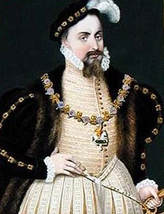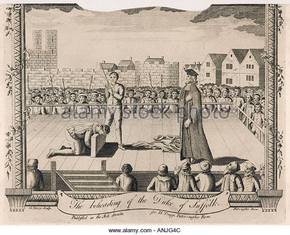The slippery slope to Henry Grey's gruesome demise, you could argue, began in the October of 1551 when both he and John Dudley became rich and powerful at the same time, they were conferred of the titles of the Dukedom of Suffolk and Northumberland respectively the very same day. However, Suffolk's machinations began three years earlier when he hoped to obtain the marriage of his daughter Jane, by placing her in the household of the Seymour family, to the future Edward VI. Thomas Seymour's death in 1548 scuppered Grey's plans. However, an alliance with the Duke of Northumberland, who we know set these plans to action, looked like the way forward.
At the beginning of 1554, Henry Grey managed to escape death for his part in the Duke of Northumberland plans usurp Mary's throne by feigning support of the new Catholic queen, however, Grey had a deep dislike of the old religion and needed no encouragement to join Thomas Wyatt's unsuccessful rebellion. By the end of January that year all was lost, Wyatt fled to Wales and the Duke of Suffolk escaped to his estate in Warwickshire, where he was betrayed by his gamekeeper.
At nine o'clock on the morning of that day Henry Grey had the opportunity to speak to the assembled crowd, he apologised for offending the queen and spoke other platitudes to gain his place in heaven. According to John Foxe, the historian and writer of the stories of martyrs, Grey was accompanied to Tower Hill by Hugh Weston, Mary's chaplain. Weston followed Grey up the stairs to the scaffold but Grey objected. Grey, wrote Foxe, pushed Weston down the steps and a fight ensued. Another account, I assume written by Foxe, tells us that when Grey's executioner asked for him for forgiveness, a man in the crowd interrupted. This man was owed money by Grey, he shouted to how he was to be reimbursed to which Suffolk replied,
“Alas, good fellow! I pray thee trouble me not now, but go thy way to my officers.”
If we accept that the written accounts of Jane Grey's death had been falsified and embellished in later years by so-called historians we must, therefore, take with a pinch of salt these stories of Henry Grey's death.




 RSS Feed
RSS Feed
